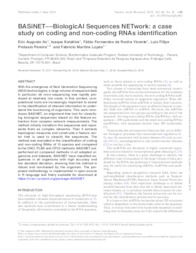BASiNET - Biological Sequences NETwork: a case study on coding and non-coding RNAs identification.
BASiNET - Biological Sequences NETwork: a case study on coding and non-coding RNAs identification.
Autoria: PEREIRA, L. F. P.
Resumo: With the emergence of Next Generation Sequencing (NGS) technologies, a large volume of sequence data in particular de novo sequencing was rapidly produced at relatively low costs. In this context, computational tools are increasingly important to assist in the identification of relevant information to understand the functioning of organisms. This work introduces BASiNET, an alignment-free tool for classifying biological sequences based on the feature extraction from complex network measurements. The method initially transform the sequences and represents them as complex networks. Then it extracts topological measures and constructs a feature vector that is used to classify the sequences. The method was evaluated in the classification of coding and non-coding RNAs of 13 species and compared to the CNCI, PLEK and CPC2 methods. BASiNET outperformed all compared methods in all adopted organisms and datasets. BASiNET have classified sequences in all organisms with high accuracy and low standard deviation, showing that the method is robust and non-biased by the organism. The proposed methodology is implemented in open source in R language and freely available for download at https://cran.r-project.org/package=BASiNET.
Ano de publicação: 2018
Tipo de publicação: Artigo de periódico
Unidade: Embrapa Café
Palavras-chave: Cardiovascular diseases, Epigenetics, Neurodegenerative diseases, Nucleotides, RNA-seq
Observações
1 - Por padrão são exibidas publicações dos últimos 20 anos. Para encontrar publicações mais antigas, configure o filtro ano de publicação, colocando o ano a partir do qual você deseja encontrar publicações. O filtro está na coluna da esquerda na busca acima.
2 - Para ler algumas publicações da Embrapa (apenas as que estão em formato ePub), é necessário ter, no celular ou computador, um desses softwares gratuitos. Sistemas Android: Google Play Livros; IOS: iBooks; Windows e Linux: software Calibre.
Acesse outras publicações
Acesse a Base de Dados da Pesquisa Agropecuária (BDPA) para consultar o acervo completo das bibliotecas da Embrapa.

